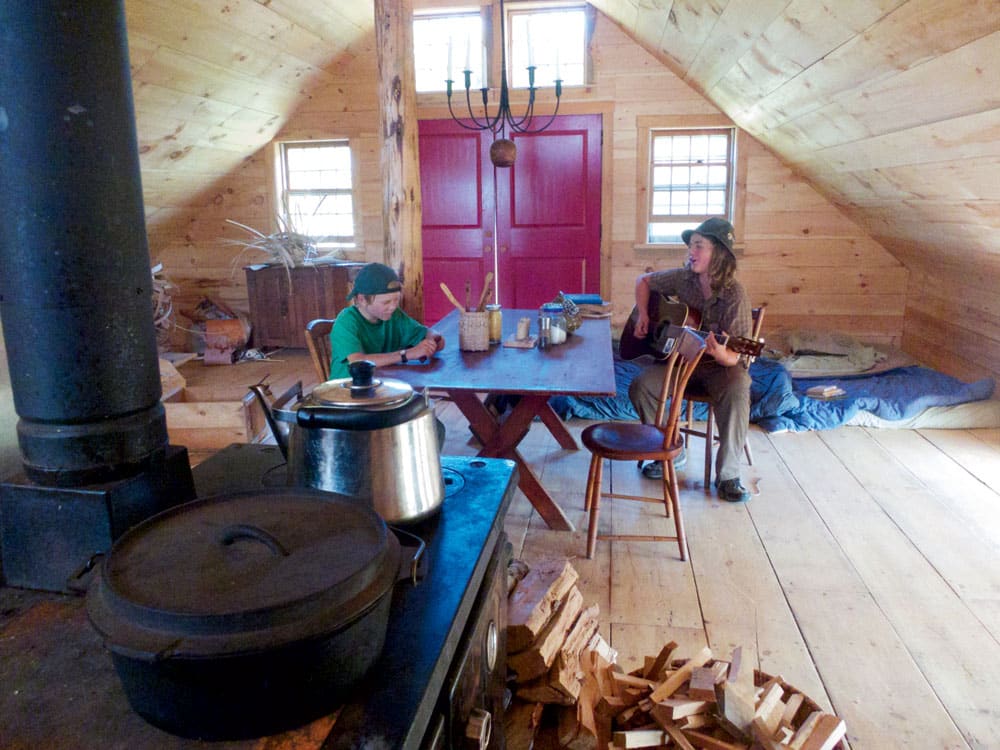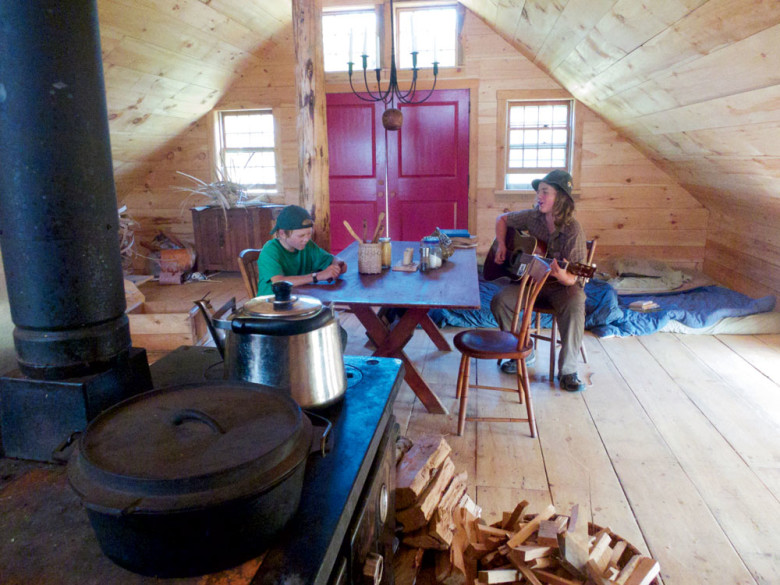Settling In | Life in the Kingdom
Moving is always stressful. But what if it involved multiple animals. And, oh, by the way, your new home has neither front door nor floor.

The Hewitts are living in a single room above the barn until their house is built, but with a woodstove and a row of mattresses, Ben says it’s “cozy enough.”
Photo Credit : Penny Hewitt
Photo Credit : Penny Hewitt
We move over the final days of October, and if it is possible for a house to revolt against its soon-to-be-former owners, this is exactly what ours does. First, a pane of glass in the porch door shatters (it may or may not have had some help from our second-born), then the thermostat in the hot water heater fails, and finally, in a coupe de grâce, the shower drain begins leaking. This is particularly problematic, since the drain is embedded in a layer of mortar that serves as a base to the tile floor of the shower. I know how thick that mortar is (very), since I laid it myself 15 years prior.
I begin chiseling away at the tile late one night, on the tail end of what must be the 40- or 50-something consecutive 12-hour day I’ve worked, but between my fatigue, the emotional terrain of the move, and the half-million other tasks demanding my attention, I soon capitulate and call a professional tile setter. “Can you come in the next two days?” I plead. We are closing in four days, and I still need time to finish the plumbing downstream of the new drain after he replaces the old one and re-tiles the shower basin. There is a pause on the other end of the line. Before he can fill it with a “no,” I continue. “I’ll pay whatever it takes.” Without question, this is the first time in my 43 years that I’ve uttered these words, and though they have exposed the pale underbelly of my desperation in a way that is ripe for exploitation, he names a very reasonable hourly rate and says he’ll be out the next day to look at the job.
The work has gone well at our new homestead, but not so well that we’ll be moving into the house, which is dried-in but still boasts bare stud walls and other deficits too numerous to mention (OK, I’ll try: no insulation, no water, no floor, no front door, no wiring … you get the picture). We’d seen this coming—this is not our first rodeo, so to speak—and had prepared accordingly, by insulating the upstairs room of the barn and installing an old woodstove. It is far from commodious—a single room, half-filled with our boxed possessions, fitted with a single carpenter’s clip light plugged into 400 feet of extension cords, and still no running water, but hey: It beats freezing to death in the dark. We arrange a row of mattresses along one end of the floor and decide that it looks cozy enough. Besides, we don’t really have any options, and I’ve always found that not having options is a really good way to learn how to accept circumstances as they are.
As many of you surely know, the physical act of moving is almost indescribably stressful; in our case, the stress is exacerbated by the need to move not just four humans and their belongings, but also one dog, two cats, five cows, two goats, three lambs, and 30 chickens. We’re also moving a couple of pigs, but they’re in the freezer, and therefore less of a concern. There is shelter for all creatures great and small (albeit some of it rustic; the lambs, for instance, will be bedding down under the protection of an old pickup truck cap), and this is comforting, as is the fact that all of these animals are known to us, and we to them. Still, livestock is not unlike humans in that one can never be sure how they will react to the unexpected, and I do not find it relaxing to consider the possibilities.
Fortunately, the animals handle the transition with far more grace and equanimity than their owners, and our fears of being introduced to the community by way of our marauding cattle as they clod hop through the neighbors’ gardens go unfounded.
With the animals moved, we make trip after trip after trip from our old home to our new one, the bed of our truck and that of our friend Michael’s piled comically high with each load. It is an arduous process, and by mid-afternoon, I feel wrung out. It is nearly nightfall by the time the final load is strapped down; Penny and the boys fill the Subaru with the remaining few boxes of miscellany, and we leave. I expect it to be harder, driving out that driveway for the last time, but it is not, and I don’t know if this is because I’m so weary, or because I completed the emotional part of the move weeks before. Probably, it’s both.
So. We reside for now in a single room above five cows and 1,000 bales of hay. When the wind blows, I hear the sliding doors of the barn thumping against the side of the building. We have no Internet, no landline, and a cell phone that works only from very particular locations outside our living quarters, so I make calls while leaning against the cows’ paddock fence. I check email every other day or so, sitting in my truck, parked in the parking lot of the nearest library, listening to the radio. Since I seem to be getting less email as I age, I’m thinking I can soon transition to once every third or fourth day and no one will be the wiser, and this makes me wonder if perhaps by the time I’m 50, I can be down to once a year.
Living in the barn is not without its challenges, to be sure, but both Penny and I are mildly shocked at how well the transition has gone. No one talks of wanting more space or more conveniences, although there is occasional grousing over whose turn it is to carry firewood up the stairs. And let’s be honest: Living out of boxes stinks. But we are warm and well-fed, and still enjoying the work that fills our days. We have enough power in the barn to add another light, a small radio, and Fin’s guitar amplifier. We have procured three new piglets, and they are fattening on the hillside behind the barn; sometimes, when I walk outside for morning chores, I hear them snoring.
Although there is much work left to do, and although our current living conditions are decidedly rustic by modern standards, I feel a renewed sense of peace after the nonstop motion of the summer and fall. And in those times when I find myself chafing to be out of the barn and in the house (this will end up taking three more months), I think about the fact that every night, the four of us, aged 47, 43, 13, and 11, lie side-by-side on our mattresses and read together, while below us the chickens are quieting on their roost, and the cows are settling in for the night. In a few minutes, I’ll close the cover of my book, and rise from bed to stoke the fire for the night.
We’re not finished with our project, not even close. I know that.
But I also know that we made it.


